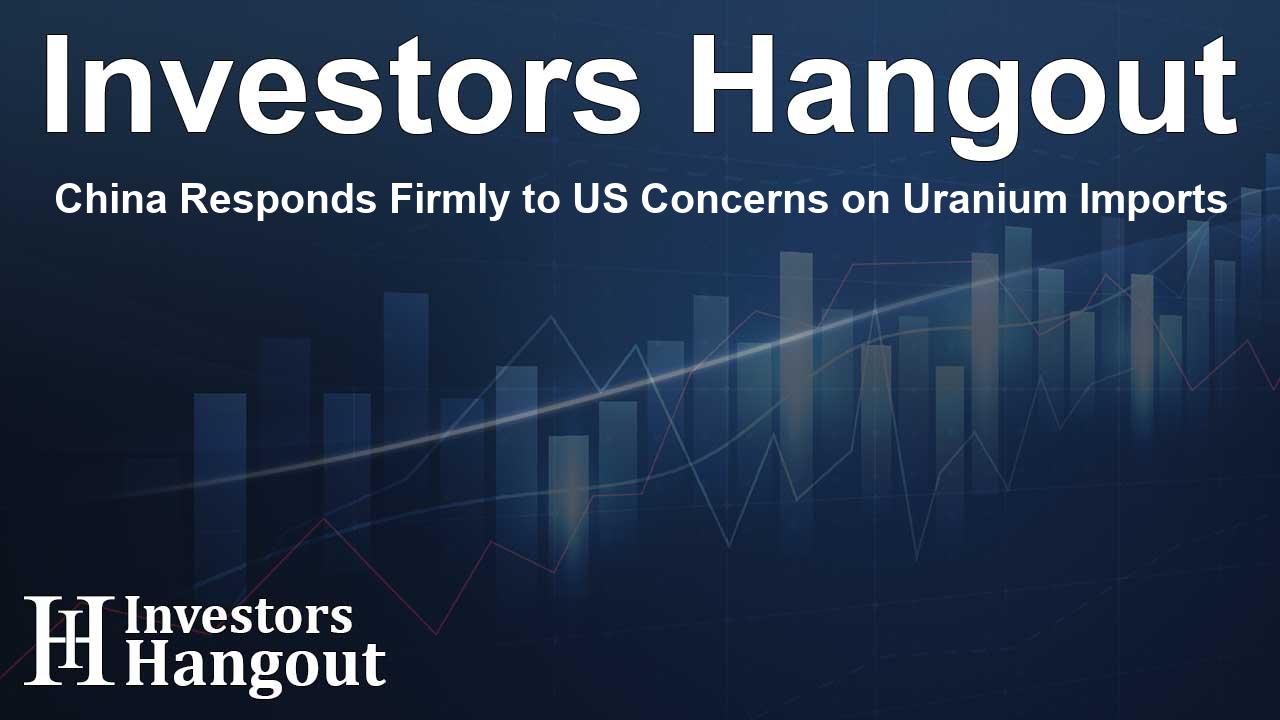China Responds Firmly to US Concerns on Uranium Imports

China's Response to US Uranium Import Investigations
Recently, the Chinese government has voiced strong opposition to a U.S. investigation that looks into claims of uranium exports allegedly supporting Russia. This reaction unfolds against a backdrop of heightened tensions between the two countries, largely driven by differing views on sanctions and international trade policies.
US Investigation: What It Means
The U.S. Department of Energy is actively scrutinizing uranium imports from China as part of its broader initiative to enforce a ban on Russian uranium, a measure that was legislated earlier this year. Reports suggest that U.S. officials are especially concerned that China might be importing uranium from Russia to fuel its nuclear power plants while simultaneously sending uranium sourced domestically back to the United States.
Understanding the Ban Context
This investigation is centered on the potential evasion of a ban that aims to restrict Russia's financial resources in light of its military actions in Ukraine. These sanctions are intended to significantly affect the economy, particularly within the nuclear energy sector.
China's Position and Global Trade Relations
In response to these allegations, the Chinese foreign ministry firmly reasserted its opposition to what it views as "illegal unilateral sanctions." The ministry underscored that cooperation between China and Russia is a sovereign decision, free from external influence, highlighting China's commitment to pursuing economic partnerships with various nations, including Russia.
The Wider Implications of Sanctions and Trade
As the U.S. tightens import restrictions on Russian goods, tensions have escalated, raising uncertainties around global uranium supply chains. The possibility that China may be circumventing existing sanctions has raised significant alarm within the U.S. uranium fuel supply industry, which has recently welcomed a substantial amount of public funding to enhance its operations.
Possible Responses from the US
If evidence shows that China is actively avoiding these sanctions, the U.S. has several strategic options to consider. One approach could be to increase tariffs on enriched uranium imports from China, currently set at 7.5%. Another possibility is for Congress to widen the ban to include uranium imports from China, which would introduce new challenges in global trade relations.
Conclusion: Navigating a Complex Trade Landscape
As the U.S. and China pursue their foreign policy objectives, particularly regarding Russia, the ramifications for international trade grow increasingly intricate. Both nations need to weigh the consequences of their actions not just on a national level but also regarding global trade partnerships, balancing the need for national security against the benefits of economic collaboration.
Frequently Asked Questions
What led to the US investigation into China’s uranium exports?
The investigation was prompted by worries that China could be facilitating Russian uranium imports, which the U.S. is trying to limit due to sanctions related to the conflict in Ukraine.
How has China reacted to US concerns?
China has vigorously denied the allegations, maintaining its opposition to unilateral sanctions and asserting its right to engage in independent trade relationships.
What are the potential consequences for the US uranium supply chain?
Concerns regarding the evasion of sanctions could impact public funding and operational strategies within the U.S. uranium supply chain, leading lawmakers to consider further measures.
Is it possible for the US to raise tariffs on uranium imports from China?
Yes, one potential response the U.S. could take involves increasing tariffs on enriched uranium imports from China if evidence shows they are bypassing sanctions.
What does this situation indicate about US-China relations?
This situation underscores the ongoing strains in US-China relations, particularly in areas of trade, national sovereignty, and global reactions to geopolitical challenges.
About The Author
Contact Evelyn Baker privately here. Or send an email with ATTN: Evelyn Baker as the subject to contact@investorshangout.com.
About Investors Hangout
Investors Hangout is a leading online stock forum for financial discussion and learning, offering a wide range of free tools and resources. It draws in traders of all levels, who exchange market knowledge, investigate trading tactics, and keep an eye on industry developments in real time. Featuring financial articles, stock message boards, quotes, charts, company profiles, and live news updates. Through cooperative learning and a wealth of informational resources, it helps users from novices creating their first portfolios to experts honing their techniques. Join Investors Hangout today: https://investorshangout.com/
The content of this article is based on factual, publicly available information and does not represent legal, financial, or investment advice. Investors Hangout does not offer financial advice, and the author is not a licensed financial advisor. Consult a qualified advisor before making any financial or investment decisions based on this article. This article should not be considered advice to purchase, sell, or hold any securities or other investments. If any of the material provided here is inaccurate, please contact us for corrections.
